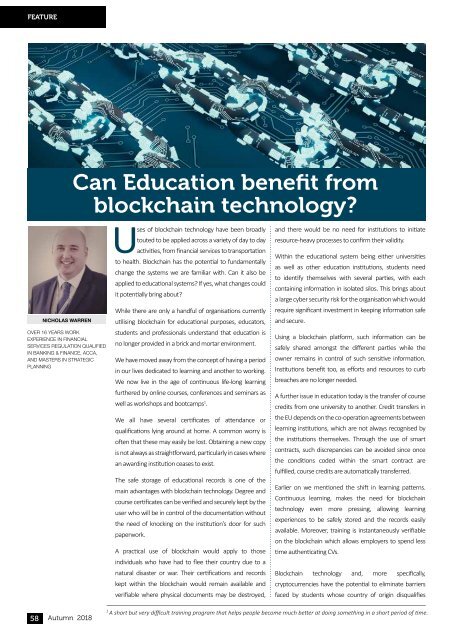THE ACCOUNTANT_AUTUMN_2018_VER-7-L
Create successful ePaper yourself
Turn your PDF publications into a flip-book with our unique Google optimized e-Paper software.
FEATURE<br />
Can Education benefit from<br />
blockchain technology?<br />
NICHOLAS WARREN<br />
O<strong>VER</strong> 16 YEARS WORK<br />
EXPERIENCE IN FINANCIAL<br />
SERVICES REGULATION QUALIFIED<br />
IN BANKING & FINANCE, ACCA,<br />
AND MASTERS IN STRATEGIC<br />
PLANNING<br />
Uses of blockchain technology have been broadly<br />
touted to be applied across a variety of day to day<br />
activities, from financial services to transportation<br />
to health. Blockchain has the potential to fundamentally<br />
change the systems we are familiar with. Can it also be<br />
applied to educational systems? If yes, what changes could<br />
it potentially bring about?<br />
While there are only a handful of organisations currently<br />
utilising blockchain for educational purposes, educators,<br />
students and professionals understand that education is<br />
no longer provided in a brick and mortar environment.<br />
We have moved away from the concept of having a period<br />
in our lives dedicated to learning and another to working.<br />
We now live in the age of continuous life-long learning<br />
furthered by online courses, conferences and seminars as<br />
well as workshops and bootcamps 1 .<br />
We all have several certificates of attendance or<br />
qualifications lying around at home. A common worry is<br />
often that these may easily be lost. Obtaining a new copy<br />
is not always as straightforward, particularly in cases where<br />
an awarding institution ceases to exist.<br />
The safe storage of educational records is one of the<br />
main advantages with blockchain technology. Degree and<br />
course certificates can be verified and securely kept by the<br />
user who will be in control of the documentation without<br />
the need of knocking on the institution’s door for such<br />
paperwork.<br />
A practical use of blockchain would apply to those<br />
individuals who have had to flee their country due to a<br />
natural disaster or war. Their certifications and records<br />
kept within the blockchain would remain available and<br />
verifiable where physical documents may be destroyed,<br />
and there would be no need for institutions to initiate<br />
resource-heavy processes to confirm their validity.<br />
Within the educational system being either universities<br />
as well as other education institutions, students need<br />
to identify themselves with several parties, with each<br />
containing information in isolated silos. This brings about<br />
a large cyber security risk for the organisation which would<br />
require significant investment in keeping information safe<br />
and secure.<br />
Using a blockchain platform, such information can be<br />
safely shared amongst the different parties while the<br />
owner remains in control of such sensitive information.<br />
Institutions benefit too, as efforts and resources to curb<br />
breaches are no longer needed.<br />
A further issue in education today is the transfer of course<br />
credits from one university to another. Credit transfers in<br />
the EU depends on the co-operation agreements between<br />
learning institutions, which are not always recognised by<br />
the institutions themselves. Through the use of smart<br />
contracts, such discrepancies can be avoided since once<br />
the conditions coded within the smart contract are<br />
fulfilled, course credits are automatically transferred.<br />
Earlier on we mentioned the shift in learning patterns.<br />
Continuous learning, makes the need for blockchain<br />
technology even more pressing, allowing learning<br />
experiences to be safely stored and the records easily<br />
available. Moreover, training is instantaneously verifiable<br />
on the blockchain which allows employers to spend less<br />
time authenticating CVs.<br />
Blockchain technology and, more specifically,<br />
cryptocurrencies have the potential to eliminate barriers<br />
faced by students whose country of origin disqualifies<br />
58 Autumn <strong>2018</strong><br />
1<br />
A short but very difficult training program that helps people become much better at doing something in a short period of time.
















